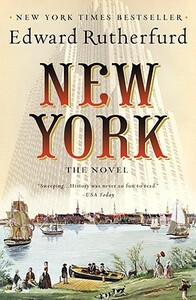Take a photo of a barcode or cover
Don't you hate when a book becomes a chore to read? This book started off well enough and then slowly crept to its ending. Rutherford's New York is like a Cliff Notes version of the history of New York told through the eyes of the old money family, the Masters. The early pioneer stories and the revolutionary bit of the tale were great. The novel totally skips over early America and the War of 1812 to flash briefly on the Civil War. From there, it is quick jumps all around. So much that you lose the culture of the time periods and you don't care about the new generation of characters. The last generation, Gorham Master, is particularly tiresome with his mid-lie crisis. The history benchmarks are predictable and I found myself thinking of other books to tell the stories of New York. What to read the horror of the Triangle Factory Fire? Read Dreamland by Kevin Baker. Italian immigrant experience in America? Read Puzo's Fortunate Pilgrim. Curious about New York during 1812? Read Beverly Swerling's City of Glory. The author may had a better luck with a series. He invested so much in the earlier chapters that you were cheated out of development in the later stages. An average read overall.
This is definitely one of the best historical fiction books I have read. It follows the Master family over the centuries as the city of New York grows and develops. It was a great read, but it was not without its flaws. Whether those flaws come from the writing or the genre, I'm not sure. I loved seeing the history as it happened. It is definitely recommended but be careful as it is a lengthy read.
emotional
hopeful
informative
reflective
tense
medium-paced
Plot or Character Driven:
A mix
Strong character development:
Yes
Loveable characters:
Yes
Diverse cast of characters:
Yes
Flaws of characters a main focus:
Complicated
adventurous
emotional
hopeful
informative
reflective
medium-paced
Plot or Character Driven:
Character
Strong character development:
Complicated
Loveable characters:
Yes
Diverse cast of characters:
Yes
Flaws of characters a main focus:
Yes
There is no way for me to try to tell you what all you’ll be getting out of this nearly 900 page book.
In the foreword Edward Rutherfurd tells us that his families are fictional, but could easily be any family of the time we’re currently reading about. In the background of each time there are real people and real events that happened. Some things I knew, some things I didn’t and looked up, some things I plan to dig into.
We begin in the 1600’s when New York was Dutch. And then the English arrived. How many stories, real and fictional, have started or at least gone awry, with those words; <b>And then the English arrived.</b> Doing Colonialist things before it was cool. Anyway. Our first family is Dutch, the Van Dycks, and they are among my most favorite of all the families/branches of the same families we see. Then the daughter marries a Master, the English family that will mostly hold the spotlight throughout this book. I really enjoyed the Revolutionary War time period, but I also happen to be fascinated with it anyway.
While the focus is nearly always on the Old Money, the Blue Bloods, there are a couple of more diverse families sprinkled in, and some we follow more than others, but I think if you’re trying to showcase New York City, you need more diversity. And I think we got more diversity, at least with the Black family that interwove the Van Dycks, Masters, and even the O’Donnells, in the first half of the book. The focus on the Irish as they began immigrating to the US was a lot more than it was for the Italians, by the time we got to them. I felt very disappointed with the Caruso family, or on their behalf perhaps. No closure!
There is a lot of focus on money, making it, investing it, watching the stocks, etc., but of course because we’re following the Old Money crowd. There are some other things sprinkled in; riots, fires, Wall Street crashes, strikes, Stonewall, but they don’t get the time they deserve. Which is absolutely understandable as this book is already nearly 900 pages and covers 300 years. So you do get a feel for each time, some more than others, and you do get to know some of the families-of-the-age quite well. So overall this was a very satisfying book. But the majority of the population of NYC has never been insanely rich white folk. White, maybe, but not rich. So to dedicate SO MUCH time to them feels off-based.
Regardless, it’s well written. You cannot provide a comprehensive historical account of NYC from the 1600’s up without taking up, idk, an entire library’s worth of shelves. I would recommend this book and give it a solid 4.
I gave it my best effort, but after 300 pages, I couldn't take it anymore. I've enjoyed some of Rutherfurd's earlier books, including Russka and London. With New York I don't know whether my tastes have changed or if I am becoming more impatient as I get older. Life is too short to read crappy books. To call this historical fiction is a misnomer—it's more like an historical comic book. I laughed when I read someone else's review of this book and they referenced Forrest Gump and the uncanny parade of famous personages popping up. At one point, when I first thought about giving up, there was an eye-rolling passage where George Washington appears at the gate of the main character's home as a group of firewood-seeking soldiers chop down a...(wait for it)...cherry tree! Come to think of it, why didn't I stop after that? In summary, the writing is pedestrian, the characters are uninspiring and the plot lines are absurd with far too many historical coincidences. I couldn't fathom slogging through another 500 pages. Although I can only imagine Daniel Webster, Horace Greeley, Abraham Lincoln, Theodore Roosevelt and John Lennon all make cameo appearances at one time or another. I will never know...and I'm okay with that. Onward and forward to the next book.
This is my first Edward Rutherfurd novel and it definitely won't be my last! It takes a commitment to read a book of this length, but I savored every page. The characters are so rich that I felt like I knew them. Thanks to Rutherfurd's dynamic plot, I learned a great deal about America's history and especially about the Big Apple. I wish he wouldn't have included the epilogue... it was unnecessary and deflated what would have otherwise been a powerful ending.
Of the four Rutherfurd novels I've read (Sarum, London, The Forest, and New York), I've really enjoyed three. New York is one of the favoured three. As usual, Rutherford introduces different families into a narrative covering several centuries, rather like a weaver at the loom. The families clash, intermarry, and work together, each generation blissfully unaware of past connections.
Ric Burn's documentary series about New York happened to be re-playing on my local educational channel at the same time I was reading this novel, so I deliberately paced my reading to coincide with each episode. The emphases are slightly different (Burns pays more attention to Alexander Hamilton than Rutherfurd does, for example), but on the whole, there seems to be an agreement about the major events in the turbulent life of the city: the American Revolution, the race riot of 1963, the Triangle Factory Fire of 1911. Burns' documentary was completed in 1999, so there's a haunting quality to the final episodes. Rutherfurd's characters, now all wealthy and well-educated, are of course fully involved in the disaster. You may want to read it to find out who survives.
Ric Burn's documentary series about New York happened to be re-playing on my local educational channel at the same time I was reading this novel, so I deliberately paced my reading to coincide with each episode. The emphases are slightly different (Burns pays more attention to Alexander Hamilton than Rutherfurd does, for example), but on the whole, there seems to be an agreement about the major events in the turbulent life of the city: the American Revolution, the race riot of 1963, the Triangle Factory Fire of 1911. Burns' documentary was completed in 1999, so there's a haunting quality to the final episodes. Rutherfurd's characters, now all wealthy and well-educated, are of course fully involved in the disaster. You may want to read it to find out who survives.
Epic novel. Loved it and learned so much. Audio book is very well read.
emotional
informative
reflective
slow-paced
Plot or Character Driven:
Plot
Strong character development:
Yes
Loveable characters:
Complicated
Diverse cast of characters:
Yes
Flaws of characters a main focus:
Complicated



